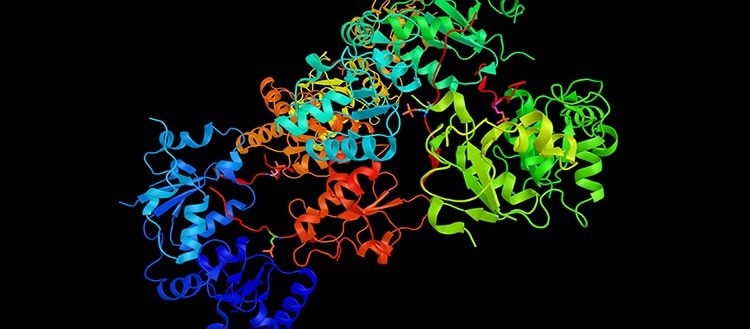Mutations in the BRCA1 and BRCA2 genes, which are inherited by 1 in 400 and 1 in 800 persons, respectively, elevate the risk of various malignancies such as ovarian, breast, pancreatic, and prostate cancer considerably.
 3D representation of BRCA1 structure. Image Credit: © istock
3D representation of BRCA1 structure. Image Credit: © istock
A new family of drugs, PARP inhibitors, was discovered to be particularly effective against BRCA mutation-related tumors in 2016. However, over half of all women with ovarian cancer will have the disease relapse within five years.
An international group led by the University of Geneva (UNIGE), Geneva University Hospitals (HUG), the Centre Léon Bérard in Lyon, the Curie Institute, the French collaborative group ARCAGY- GINECO, and the European consortium ENGOT studied the genetic data of 233 patients enrolled in a pre-marketing phase III clinical trial of olaparib, a PARP inhibitor combined with bevacizumab, a drug already used to treat ovarian cancer.
The scientists determined that the effectiveness of PARP inhibitors is determined by the exact location of the mutation on the gene. These findings, published in the journal Annals of Oncology, show that very high precision treatment is attainable in oncology.
The BRCA1 and BRCA2 genes encode proteins that repair DNA double-strand breaks, an extremely devastating kind of DNA damage, and thus play an important role in cell genomic integrity. Cells that have been mutated are less able to repair damaged DNA, which promotes the development of malignancies.
The resulting cancers are particularly aggressive. Ovarian cancer, which often has a very poor prognosis, is one of the most common cancers in women who carry a mutation in one of these two genes.”
Dr Intidhar Labidi-Galy, Researcher, Department of Medicine and the Translational Research Centre, Onco-Haematology, Faculty of Medicine, University of Geneva
Dr Intidhar Labidi-Galy is also a staff physician in the Department of Oncology at the Geneva University Hospitals, and a corresponding author of the study.
The recent advent of PARP protein inhibitors, such as olaparib, is a significant therapeutic advance. For the first time, a treatment with a considerable improvement in overall survival was offered.
“But although previous studies showed PARP inhibitors to be highly effective in BRCA1 and BRCA2 associated cancers, almost half of the patients had their cancer recur. Why did this happen? That’s what we wanted to decipher here,” added Dr Intidhar Labidi-Galy.
Unevenly effective drugs
The researchers examined BRCA1 and BRCA2 mutations in 233 patients who participated in the phase III PAOLA-1 clinical trial, a pre-marketing study of olaparib combined with the anti-angiogenic medication bevacizumab, which is already used to treat ovarian cancer. The patients had advanced ovarian cancer and all had a BRCA1 (159 patients) or BRCA2 gene mutation (74 patients).
We decided to increase the precision of our analyses by detailing the mutations involved, and especially what differentiated those sensitive to the drug from those that were less so. And the difference comes from the localization of the mutation on the gene: if the mutation is located in the DNA-binding domain, the drug is actually much more effective.”
Isabelle Ray-Coquard, Professor, Oncology, Centre Léon Bérard, National Federation of Centers for the Fight Against Cancer, Unicancer network
Isabelle Ray-Coquard is also associated with Claude Bernard University in Lyon, which supervised this work.
DNA-binding domains are protein motifs that can bind to DNA and are used to control how genes are expressed.
PARP inhibitors aim to create an accumulation of DNA breaks in mutated cells, leading to their rapid death before they can create malignant tumors. It would seem that mutations in a DNA-binding domain accelerate this process and significantly increase the effectiveness of the drug. It is less the case when the mutation concerns other functional parts of the gene.”
Dr Manuel Rodrigues, Study Co-First Author and Practising Hospital Physician, Institut Curie
An international academic study
These findings underscore the importance of precision medicine in oncology.
Isabelle Ray-Coquard explains, “It is undeniable that this class of drugs is extremely effective in a large proportion of patients—some even seem completely cured, whereas a few years ago they would have been doomed, and 90% of people with a mutation in a DNA-binding domain of the BRCA1 gene have not relapsed when the analysis was conducted.”
“But it is important to understand the precise mechanism of action of the drugs and to refine the treatments according to the genetic profile of the patients and of their tumors. Here, the location of the mutation is the key point,” concluded Isabelle Ray-Coquard.
This is the first international academic study of its kind, and it is part of a precision oncology approach in which decoding the genomes of patients and tumors is vital. The latter enables for more precise targeting of diseased cells through the development of particular inhibitors, which will also help to prevent side effects.
Source:
Journal reference:
Labidi-Galy, S. I., et al. (2022) Association of location of BRCA1 and BRCA2 mutations with benefit from olaparib and bevacizumab maintenance in high-grade ovarian cancer: Phase III PAOLA-1/ENGOT-ov25 trial subgroup exploratory analysis. Annals of Oncology. doi.org/10.1016/j.annonc.2022.11.003.